A tribute to Willy Wonka; or, a thank-you to my dad
"Don't forget what happened to the man who suddenly got everything he wanted. He lived happily ever after."
Thank you. Thank you. Thank you.
I’ve always associated Willy Wonka and the Chocolate Factory with my dad. It was the kind of movie that, if it was on TV, it was on in my house. Naturally, without thought. Looking back, it was such a common watch that it wasn’t really a watch… more like background noise, extended members of the family just chatting about candy in my periphery as I played or did homework or ate dessert.
I don’t ever remember sitting down to watch this film at any point. I simply remember it being on.
“Wait a minute. Strike that. Reverse it.”
As a little girl, I enjoyed this movie, but it was never quite magical for me. Frankly, the kids annoyed me too much (although I always wanted to play Veruca in a musical version). In some ways, I think I was missing the bigger picture. I didn’t appreciate this movie in the way that I do now. And somehow, I was missing the whimsical wonder that was Gene Wilder.
How could I miss Gene Wilder?
Funnily enough, I think it must be easy for kids to miss Willy Wonka. The story isn’t about him. He’s not the protagonist, nor the mentor, nor the villain. He’s just… wacky. Even now, as an English major, I’m not sure what archetype Wonka falls into. And really, I love that.
Inside his colorful factory, Wonka almost blends into his own imaginings. Purple velvety coat, chocolate-brown hat, jaunty sort of walk with a cane that may or may not be a fashion accessory… he’s as much of an invention as everything else that he created. Willy Wonka managed to achieve what most of us only dream about: he became exactly who he’d always wanted to be.
I had no idea how important “Pure Imagination” would become to me in the years to follow. It’s one of my favorite songs now. There’s a reason I bought a sweatshirt that says, “there is no life I know to compare with pure imagination.” It wasn’t until after I fully embraced my calling as a creative that this song and this story started to matter to me.
These days, I watch Willy Wonka and the Chocolate Factory almost solely for Willy Wonka (and the set design).
But it wasn’t Gene Wilder that made me fall in love with Willy Wonka and the Chocolate Factory… it was Timothée Chalamet.
Hold your gasps and allow me to explain.
Last autumn, the sugary-sweet trailers for Wonka were taking the Internet by storm. I remember the hesitation in many fans of the original movie, worried about prequels and wokeness and Gene Wilder’s legacy. As a fan of Timothée Chalamet, even I was concerned about how Laurie Laurence would shoulder such an iconic role.
“So shines a good deed in a weary world.”
Hollywood’s tendency to churn out unwanted and rather terrible sequels has soured society toward the entire idea. The fact that an A-list heartthrob-type actor was spearheading the project definitely worried fans, who waited anxiously as the days until December dwindled and dwindled.
I don’t have any recollection of planning to go see Wonka in theaters myself. I was aware that it was coming out, of course. I’d seen a few behind-the-scenes photos taken on set, as well as the trailer, but I don’t think it interested me too much. Despite not yet feeling personally attached to the 1971 film in any way besides nostalgia, I wasn’t so willing to allow Hollywood to pry another beloved character out of the past and ruin him for the sake of commercialism.
All of this changed, however, when my parents decided that my youngest sister’s birthday party would involve taking a handful of her friends to the movie theater to see Wonka. I was presented with the option of tagging along, and I agreed, mostly because I wanted to hang out with my parents, and I enjoy going to movie theaters as an experience. Plus, nothing beats movie theater popcorn — especially when someone else is paying. So it was that we piled into two cars and drove off on a cold December night, in search of newfound pure imagination and a teeny-tiny green-haired Hugh Grant.
(My love of seeing movies in their natural habitat is bountiful enough for another essay).

Instead of a massive theater, we saw Wonka at an older theater, a small one about a half an hour drive from my home. I love it there. When you step inside, a wall mural is dedicated to Oscar-winning films. Movie posters (presumably the outdated ones used to advertise out front) are available to buy. The theater space itself is small, with a little wooden stage up front that could definitely be used for performances or readings. I’ve always thought that it would be the perfect place for a book release party, if I ever manage to get my manuscript off the ground.
I don’t think there’s much better than growing up in small-town America. Where else could I find a gem like this?
While my sister and her friends ran up to the front of the theater, my parents and I hung near the back, smiling at the unbridled joy of kids. I settled into my seat, plunged a hand into my buttery popcorn, and directed my attention to the screen, uncertain of what I was about to see. Walking into that theater, I had no expectations.
What happened over the course of the next two-ish hours, I can only describe as pure, unadulterated magic.
“Everything good in this world started with a dream, so you hold onto yours.”
I am positive that, whatever I felt while watching Wonka, was the same feeling that kids the 70s had watching Willy Wonka and the Chocolate Factory.
There is something so special about real, true earnestness in media today. Anymore, I feel like stories are cynical and harsh, favoring “realism” over the risk of appearing “cheesy.” To this point, I raise the argument; what’s so wrong with being cheesy? When did we become afraid of true, unfiltered joy?
The whimsy of Wonka took my breath away from the opening scene, and for two hours, I felt as if I’d been whisked away to a world of down-on-their-luck dreamers, a world where, for two hours, anything was possibly if I could dream it. I recognized myself in Wonka’s determination to see magic in the ordinary and in his relentless pursuit of what he wanted.
I’ll say this for the man; he knew how to hold onto a dream.
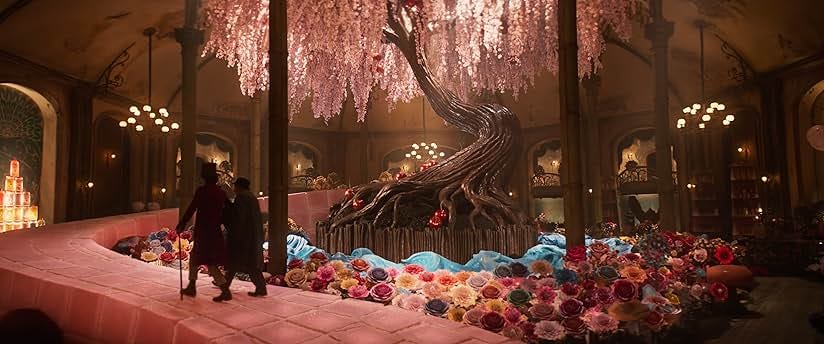
I was twenty years old at the time, just about to turn twenty-one, but I felt giddy as my younger sister. And let me tell you, to feel pure, childlike wonder again… that was the most amazing gift. If I could shake the hand of every single person who worked on that Wonka — every actor, filmmaker, crew member, set designer — I would. They gave me such an incredible gift: awe.
Arguably (no, scratch that — objectively), the best scene in Willy Wonka and the Chocolate Factory occurs when the children enter the factory for the first time, serenaded by Wonka as he encourages them to indulge in his world of creativity with open hearts. I think that their expressions of amazement and glee must have been mirrored on my own face in that tiny theater… I was enchanted. I’d been whisked away from the cynicism of the world, and I’d found pure imagination once more.
“If you want to view paradise, simply look around and view it.”
Isn’t this the most beautiful sentiment? That, if we truly want to find beauty and goodness and imagination and love, all we have to do is look around? That our only limitations come from the boxes we place ourselves into? That paradise is right outside our window, if only we have the courage to venture outside?
I felt different after I left that hometown movie theater, the soundtrack still echoing in my ears. Consuming a new piece of media that you just know has fundamentally changed you is such an intoxicating buzz. On the drive back, my sister and her friends giggled about the Oompa Loompa and his sarcastic quips, but my heart rested on the themes of the movie.
While Wonka is a kid’s movie, as are all the iterations of the character that came before (although I can’t speak for Jonny Depp’s interpretation. I have truthfully never seen that version and I have no interest in seeing it). However, the themes woven through the playful narrative had me in tears.
“I just wanted it to feel the way that it did when I was a kid.”
That line breaks my heart. Every time.
How often have I gone in search for the same joy and innocence we all seemed to lose? Peter Pan was right; we never should have grown up.
Everyone has certain scenes that are just difficult to watch. For me, it’s watching a dreamer lose their light. I can’t stand scenes like that. Watching a character stare hopelessly as everything they’ve worked for shatters, watching them walk around the ruins of their dream, watching their eyes fill with tears as the full weight of all that has happened hits them… it destroys me.
Wonka was no different. After the colorful, Broadway-esque joy that was “A World of Our Own” (my personal favorite song in the film), to see the chocolate shop destroyed was nothing short of a tragedy. And watching Wonka simply stand there as those who loved his dream tore it down it was infinitely worse.
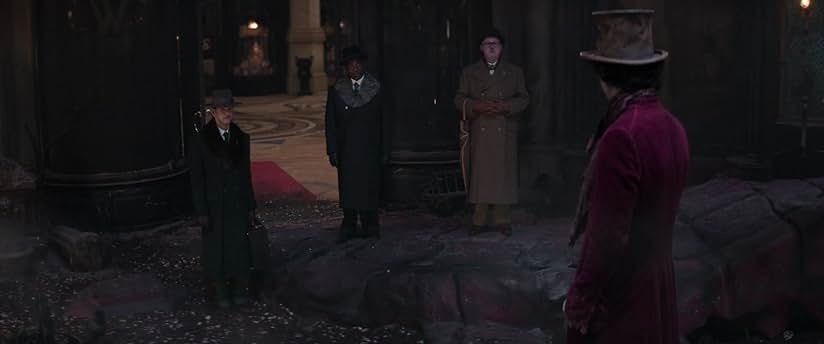
As much as I despise this type of scene, it’s actually a trademark in story structure. Writers call this “the dark night of the soul.” It’s the ultimate low-point for the protagonist, and they are forced to make a choice. This is usually the point in the movie where the protagonist walks away from the dream, then turns around and comes back to save the day just in time.
I mean, LOOK AT THE SCENE! Even his vibrantly purple coat (which I totally want) seems dull and droopy. This is not where we want our beloved Willy Wonka to be.
When I say that I can’t handle this scene, I mean it. Even on rewatches, it hurts my heart. Because I have been there. Sure, no one has ever sabotaged my chocolate supply and burned down my store, but I have seen my dreams get dragged in the mud.
When I think about where I was mentally that night, I think I definitely needed a movie about dreams. I’d reached the end of my first querying adventure, and no agents had shown any real interest in my book. It was a gutting, defeated feeling. My art, discarded. I was a dreamer… and my dreams had failed.
Just like loving, dreaming is a risk. When you hand your heart over to a dream, there’s a chance of it getting shattered. That’s just life. But when I watch movies like Wonka and Willy Wonka and the Chocolate Factory, I realize that there is no better way to live than with your feet on the ground, your head in the clouds, and your eyes wide open.
A month later, I started a radical redraft of my novel, and at this point in my author journey, things are better than they’ve ever been.
“There is no life I know to compare with pure imagination. Living there, you’ll be free if you truly wish to be.”
The other day, I found myself despairing about my dreams. Strangely enough, things have been going so well for me lately that I’ve been afraid of stumbling. I’ve been worried about brushing my dreams with my fingertips, only to have them snatched away.
“It’s weird,” I’d texted my dad, “to be sort of close to your pipe dream.”
I was scared that my chocolate shop was about to catch on fire.
I was scared to watch it burn, frozen and helpless.
And my dad - my wonderful dad - sent me a quote that brought me to tears. It was from Willy Wonka and the Chocolate Factory, spoken by the character that we both love:
"Don't forget what happened to the man who suddenly got everything he wanted. He lived happily ever after."
I burst into tears.
That’s one of the best lines, best endings, and best hugs in cinematic history.
It was exactly what I needed to hear.
Dreams really are worth the risk, aren’t they? Happy endings aren’t just a fictional concept. They don’t have to be written by Hollywood hotshots. In fact, the best happy endings are written by God, and there’s immense comfort in knowing that He holds the pen in the story of my life, not me. Whatever He’s writing is beyond my wildest daydreams.
I’m an optimist. I build chocolate factories in my mind and I decorate them with wallpapers that taste like snozzberries just because I think I can. I look around, eyes wide open, and I view paradise. I live in a world of pure imagination. There is no better way to live.
Part of that optimism is due to Wonka. Part of that is due to my dad. Both make me believe that, if I so desire, I can change the world.
So, thank you. Thank you. Thank you.
“We are the music makers; we are the dreamers of dreams.”
P.S. - if you ever want to believe in the good of the world again, Google any scene from Willy Wonka and the Chocolate Factory and read the YouTube comments :)
Quotes from:
https://parade.com/1280148/kaigreen/willy-wonka-quotes/
https://www.imdb.com/title/tt6166392/quotes/
https://genius.com/Timothee-chalamet-sorry-noodle-lyrics
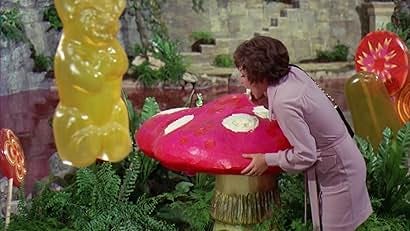




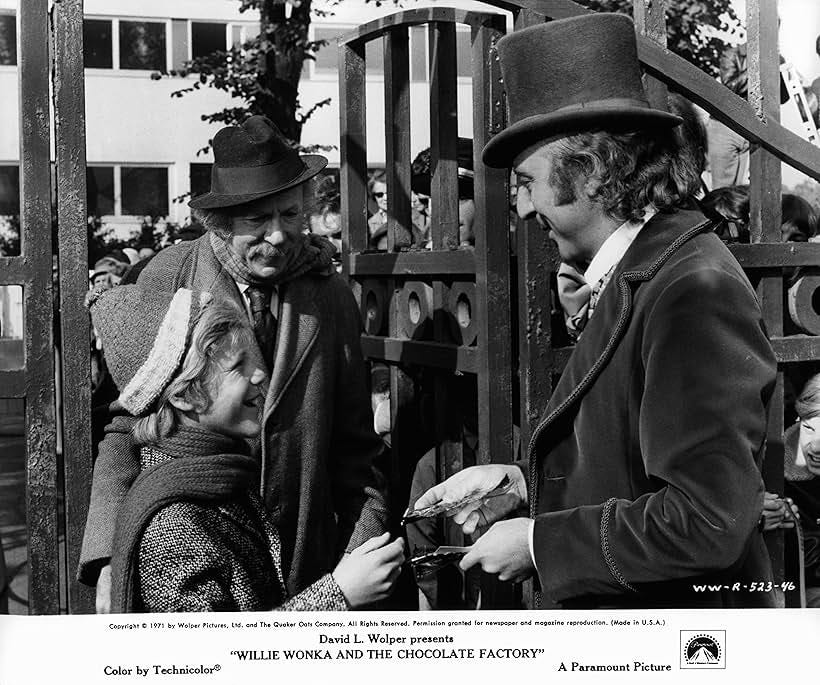

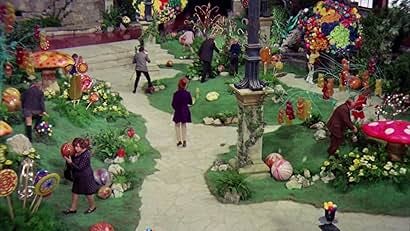
Love you, keep dreaming
Very *sweet*